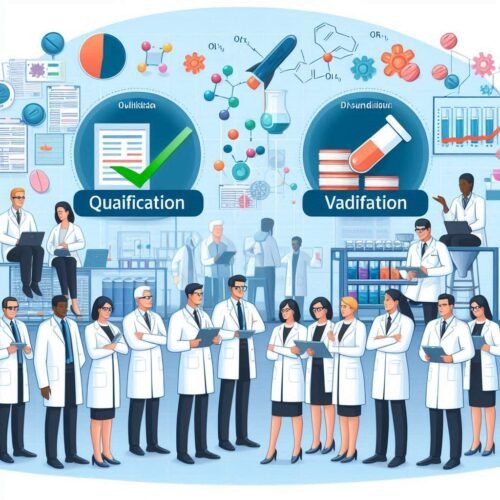Learn the key difference between validation and qualification in pharmaceutical manufacturing and why both are essential for GMP compliance and product quality.
Qualification ensures that equipment, systems, or facilities are installed and operate correctly, while validation confirms that the entire process/method consistently produces the intended results.
In the pharmaceutical domain, validation and qualification are two essential concepts that ensure products are made consistently, safely, and according to regulatory standards. While they are often used interchangeably, they serve distinct purposes in ensuring compliance and product quality.

Qualification refers to the process of proving that facilities, systems, and equipment are properly installed, operate as intended, and perform consistently within specified limits. It is broken down into four stages:
Validation is the process of confirming that an analytical method is suitable for its intended purpose and produces reliable, reproducible results under specified conditions outlined in the method. This ensures that the method, once developed, meets specific regulatory requirements and can be used consistently for routine analyses.
Types of validation include:
| Aspect | Qualification | Validation |
|---|---|---|
| Focus | Equipment, systems, and facilities | Processes and procedures |
| Scope | Installation and operational performance | End-to-end process performance |
| Examples | HVAC, autoclaves, cleanrooms | Analytical method, Sterile filling process, tablet compression |
| Documentation | IQ, OQ, PQ reports | Validation Master Plan, protocols, reports |
| Regulatory Guidance | EU Annex 15: Qualification and Validation | PA/PH/OMCL (13) 82 R5 Validation/Verification of Analytical … |
Neglecting either can lead to compliance issues, product recalls, or patient risk.
Understanding the difference between validation and qualification is essential for maintaining product quality and regulatory compliance in pharma manufacturing. Qualification ensures your tools and systems are ready; validation ensures your processes deliver results. Together, they form the backbone of a compliant, high-quality production environment.
Related
Yes. Qualification is often considered a subset of validation, especially in the context of equipment and facilities.
No
Qualification ensures that equipment, systems, or facilities are installed and operate correctly, while validation confirms that the entire process/method consistently produces the intended results.
Risk assessments help determine the scope and depth of validation/qualification efforts, ensuring critical elements are thoroughly evaluated.
Further Reading
Quick Links